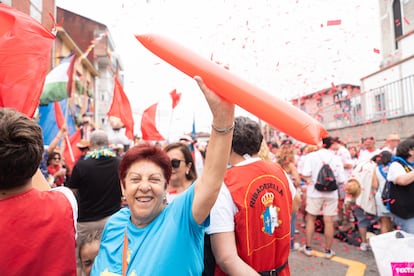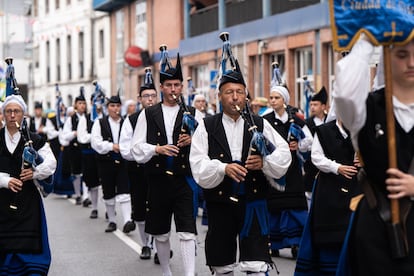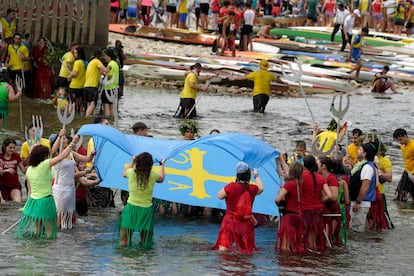“But are all those people leaving at the same time?”, a chronicle of the Sella descent from Arriondas

Life fits into a summer morning in Arriondas. That's why thousands of people come here every first Saturday in August after the 2nd, when the International Descent of the Sella River —the Canoe Festival in popular speech—is celebrated.
" Mecca! And so many uniforms?" a woman asked as she passed by the town hall.
It's eight-thirty in the morning. Officials, military personnel, the Civil Guard, and the National Police are gathered in the Town Hall Square. They are waiting for the official breakfast.
-One more year!- a man greets.
-One year less!- his friend answers.
Optimism and pessimism merge in an embrace.
Adrián Barbón , President of the Principality of Asturias, arrives.
" This kid has lost a lot of weight!" says a woman, in what may be the first time in history that an Asturian woman of grandmother's age has commented on someone's weight loss instead of highlighting the weight gain.
The morning mixes the survivors of the previous night—the music stopped a couple of hours ago—with the hundreds of motorcycles, cars, and buses that are coming to Arriondas from all over Asturias.
Two young girls manage their excesses, sitting on a sidewalk, their heads buried between their knees.
"Look, 20 years ago you and I were them," says a couple of girls who pass by and stop:
-Are you okay? they ask.
-Yes, yes, they answer.
-Well, don't worry. Someday you'll wake up early to come. Look at us.

The morning progresses, and vests adorned with pins—of Cobi in a canoe, for example—and badges, the spiky monteras, the Hawaiian-inspired paper necklaces (perhaps in Hawaii they say they're Asturian-inspired) are taking over the streets of Arriondas. Many perfectly uniformed families.
The sporty types, the canoeists, are also appearing. It's important not to confuse them with "piragüeros," a term used to refer to people from outside Asturias who come primarily for the nightlife.
At the Campoamor confectionery, the handwritten letter explains the morning:
“Beer 3 euros.
Return 3 euros.
Calimocho 4 euros.
Summer red wine 4 euros.
Cuba Libre 6 euros.
Coffees 2 euros.
Cola Cao 2 euros.
Pastries 2 euros.”
There are up to three lines of people at the bar. The first thing to sell out—temporarily—was the coffee, which is served in thermoses.
-Auntie, we haven't seen each other since last year, in this same place- one girl says to another- How are you?
"Is no one really going to eat the palm tree?" a father asks after waiting in line for half an hour to get it.
In that half hour, the two friends who had just reunited caught up. And they said goodbye.
It's ten o'clock in the morning. Back on the street, the parade begins.

The City of Oviedo bagpipe band passes by.
A representation of the Asturian monarchy passes by—in disguise.
"Hey, there's a guard who's curious, huh?" one woman says to another. Curious, in Asturias, also means to be attractive.
A boy wearing a pink ONCE jersey and a Fregaderos Teka cap crosses from sidewalk to sidewalk.
"We always stand where people cross," a man says to his wife.
Loudspeakers located in the streets of Arriondas narrate the parade. A bit like that Oliver and Benji series , where the action was reported live.
"Let's go to the river now, please," a girl implores.
"Would you like to relax a little, please?" another woman answers.
The god Cronus passes by.
And a truck with music. The Sonia and Selena song plays. And when the part about "...when the heat comes, boys fall in love..." comes on, everyone starts singing.
At 11:15, the banks of the Sella are packed with people. Some are bathing. And some are leaving crates of cider cooling in the water.
"There are more people than ever this year," says a woman.
"Every year you say there are more people than ever," his companion replies.
"It's that every year there are more people than ever," she says.
The Hevia March of May 2nd plays over the PA system. And then, a string of local businesses sponsoring the descent, a festival declared of international tourist interest.

"But are all those people leaving at the same time?" asks a first-timer.
(All of these people are 1,304 athletes from 25 countries distributed in 901 boats).
-Yes, her partner answers.
-And how do they fix it?
-Now you see it. You're going to freak out.
But before that girl sees it and freaks out—or not—a truly significant event will occur. At 11:41 a.m., a 19-minute cycle will begin in which the three Asturias will coincide in space and time. The three songs that have earned the right to have an article before the title or the name of their performer. The first Asturias will be Asturias, by Víctor Manuel. The second, Asturias by Melendi. And the third, Asturias Patria Querida, whose last note will kick off the race.
"Look, look, look..." says a boy, pointing at the bristling hair on his forearm.
Before the anthem, Olympic champion Theresa Zabell will read the proclamation, giving way to the part that captures the essence of the Sella: cheers for the participating countries. "Long live Ukraine!", "Long live Venezuela!", and "Long live Singapore!" The decibels rise noticeably for Spain and Asturias.
In just four minutes, all the canoes disappear from the field of vision of the thousands of people who have come to watch the departure.
"What a thing canoes are, huh?" a girl throws into the air philosophically.
The race has been going for eight minutes. Two canoeists are trying to fix their boat. They're desperate. They make a snag, climb into the boat, and paddle forward with an almost melancholic flow.
From now on, people will joke about the recreational canoes launched after the official outing. Joking here means tipping them over, lifting them into the air with their passengers inside, or putting huge rocks on the back. All with a smile on everyone's face.

Music is returning to the streets. These are songs that have been playing here for years and years: "Nothing of This Was a Mistake " by Coti; "Princesses " by Pereza; and "Mother Earth (Oye) " by Chayanne. You have to be very classically contemporary to be playing in Piraguas.
Twenty kilometers downriver, at the finish line in Ribadesella, the mystery that surrounds every competition is about to be solved: the result.
In Arriondas, people are watching the finish of the race on a giant screen. They scream as they watch the men's K2 champions, Asturians Walter Bouzán and Bertín Llera, enter. One hour, 10 minutes, and three seconds have passed since the start. Galicians Tania Fernández and Tania Álvarez will win the women's K2 with a time of one hour, 22 minutes, and 59 seconds.
The party spills into the streets.
Two girls walk across the bridge where the proclamation was read and the starting line was given. Now it's empty. Just like the banks.
- Joe , there are 365 days left until the next canoes-, says one.
-Well, but it flies by-, the other answers.
They link arms and walk briskly back toward the music. Straight to the place where life now gathers on this summer day in Arriondas.
EL PAÍS




%3Aformat(jpg)%3Aquality(99)%3Awatermark(f.elconfidencial.com%2Ffile%2Fbae%2Feea%2Ffde%2Fbaeeeafde1b3229287b0c008f7602058.png%2C0%2C275%2C1)%2Ff.elconfidencial.com%2Foriginal%2F51d%2F133%2Ff88%2F51d133f88058cb7656a292db72c6f1b8.jpg&w=3840&q=100)
